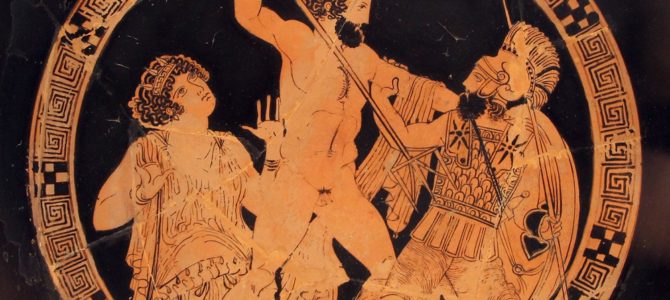
“Don’t speak to me of great proposals. For I have no desire for them, but only to twist justice enough to give my creditors the slip.”—Strepsiades, “Clouds”
Roughly 2,000 years ago, Aristophanes, a Greek playwright, composed a play that tells us everything we need to know about the state of American politics today. It’s called “Clouds.” Within it, Aristophanes examines two particular kinds of speech, just and unjust speech, and their timeless conflict.
Aristophanes’ thesis is this: because human beings are flawed, we naturally seek power over others to secure our interests. We see this action as good, and the most advantageous means to this good is unjust speech.
Just and Unjust Speech Personified
For those who have not read “Clouds” yet, it is important to understand that the play is a critique of contemporary intellectuals, those strange men who have their “heads in the clouds.” Midway through the play are two characters, Just and Unjust Speech. Although their names are strange, these characters represent two conflicting philosophies of life as characters who, in the context of Socrates’ school, must literally “sell” their wares through debate.
An astute reader will notice several important details about both characters. Just Speech’s arguments are rooted in tradition because, as is customary, tradition goes unchallenged. Furthermore, Aristophanes writes that Just Speech’s appearance is like that of a beggar who wears antiquated, thread-bare clothing. The meaning is clear: Just Speech is outdated and clearly not in-touch with what is “cool” at the moment. A contemporary analogy might be a conservative grandparent or that old man who screams at children to get off his lawn.
Unjust Speech is a “hipster.” Adorned in fashionable attire, he challenges convention mercilessly and even the thought of “tradition” sends him into hysteria. Someone like former president Barack Obama comes to mind.
The Clash of Philosophies
The display of both philosophies follows this general pattern: Just Speech makes an argument from tradition and Unjust Speech refutes it as nonsense, outdated, and outrageous. Just Speech is then unable to make a counterargument and the “debate” moves forward. Throughout this, each philosophy sells particular benefits.
Just Speech argues that if he is chosen, the student will be ashamed of shameful things, possess good manners, not misbehave towards his parents, grow in stature, and more. Furthermore, Just Speech warns that if Unjust Speech is chosen, one will learn that “everything shameful is noble, and the noble is shameful.”
Contrarily, Unjust Speech offers the following: “It is worth more…to choose the weaker speech and then to win.” Essentially, Unjust Speech offers an easy victory. It is far easier to call someone a racist or a Nazi rather than engage in an intellectual discussion.
Here is the significance of the debate: students must either choose the stronger speech (Just) or the weaker (Unjust) that overturns the stronger. If a student aligns himself with Just Speech, the student commits himself to a virtuous life. If a student chooses Unjust Speech, he can solely pursue his interests without restrictions.
Either students will choose to live a life of self-governance or a life of pleasure-seeking. The state of American politics today is roughly divided between these two camps. Each American is a “student” in this school.
How to Respond to Unjust Speech
The question now becomes, how can Unjust Speech be dealt with? There are two outcomes, one ideal.
Conservatives must understand that arguments cannot simply be rooted in tradition. We cannot “blindly” accept our beliefs. To say “lowering taxes is good for the economy because it helps the middle class” isn’t good enough. I could just as easily say, “Higher taxes are good for the economy because they help the middle class.” Who is right here? There must be reasons behind arguments, not just an appeal to a tradition that few understand.
This first possibility is the prospect of returning to true civil discourse where Americans work together for the public good. The other possibility, however, is far more likely. And what good is reason and logic when your opponent is unwilling or refuses to listen?
While Aristophanes did not answer this question, Plato does in his “Republic.” At the very beginning of the work, Socrates is confronted by Polemarchus, whose approach resembles that of a modern liberal:
Polemarchus: either you must prove yourselves stronger… or you will have to stay here.
Socrates: Isn’t there another alternative still: that we persuade you that you should let us go?
Polemarchus: But could you persuade us, if we won’t listen?
Socrates: There is no way we could.
Conservatives must take up the torch of truth and own their positions. Americans must remember Aristophanes’ insights while consciously remembering Plato’s warning of a world ruled by force, where might makes right, and the end justifies the means.
The wisdom of both thinkers is timeless. Objective truth depends upon the bastion of reason. Subjective truth is the mistress of force. If America does not return to a culture of political and moral civility, Aristophanes and Plato’s warnings will have come true.









